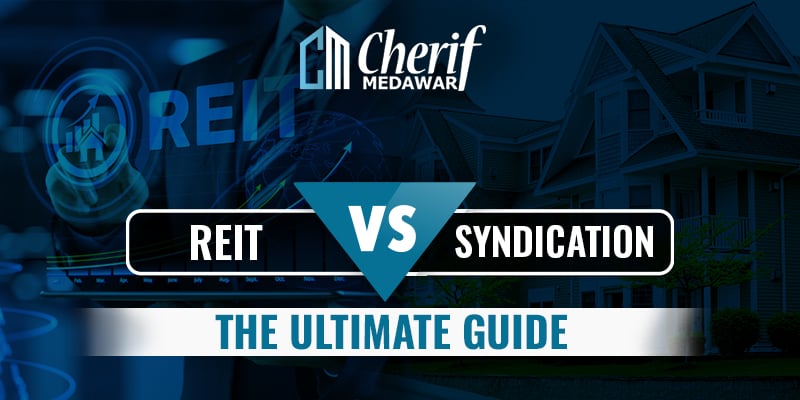REITs and syndications are both types of real estate investments. REITs and syndications have a lot in common.
What Is a REIT?
REIT stands for “real estate investment trust.” REITs are companies that pool investor funds to purchase real estate assets like office buildings, apartments, and hotels. These properties are owned by the REIT and rented out to tenants. Investors receive a payout based on the property’s performance and an ownership stake in the company.
The Securities and Exchange Commission (SEC) governs REITs and requires them to pay out 90% or more of their taxable income as dividends to shareholders. There are many different types of REITs based on their size, strategy, or focus. The most common type is an equity REIT, which usually focuses on owning commercial real estate properties such as apartment buildings or office buildings. Another type is a mortgage REIT, which focuses on financing residential mortgages instead of owning homes directly.
What Is a Syndication?
Syndication is an agreement between multiple investors and one or more property owners. In this agreement, each investor puts a certain amount of money into the deal in exchange for a share of ownership in the project, a specific project with a specific capital raise and end date. The Syndicator then raises and pools funding for the project and oversees its development and construction. Once the project is completed and sold, profits from the sale go back to investors based on their percentage of ownership and set terms of the syndication. The Syndicator may also be defined or called: Sponsor, Executive Manager; and may hold the roles of Property Manager (unless they hire on an outside Property Manager), Project Manager and overall CEO of the project. These roles and responsibilities will be defined in the Offering.
How does real estate syndication work?
Investors pool together money and use it to purchase properties that meet certain criteria determined by the syndicator or manager of the deal. In some cases, the manager then finds tenants for these properties who will pay rent on time every month, allowing investors to collect their share of the profits from renting out these units. An investor can make an interest return and get paid on the exit, as defined in the syndication.
The Sponsor usually will hire a Property Manager who will then take care of everything else that comes up with managing a property – including repairs, maintenance and even leasing out vacant units if there are any left after all the tenants sign their leases.
Main differences between REIT and Real Estate Syndications:
Direct Ownership
REITs offer direct ownership of the property through shares, while syndications involve indirect ownership through an investor group. With syndication, investors pool their cash together and purchase a share of property from a developer or seller. Shareholders don’t own any part of the property directly; they only own shares in the trust (or corporation).
Value Volatility
REITs are designed to provide stable returns with little or no volatility. This makes them ideal investments for retirement accounts or other long-term goals. Syndications, however, can be more volatile than traditional stocks due to their diverse nature and relatively short track record as an asset class.
Tax Benefits
REITs typically pay dividends at a higher rate than most stocks because they’re required by law to distribute 90% of their taxable income each year. This makes them an attractive choice for investors looking for yield without compromising liquidity. Syndications may also be eligible for tax benefits if structured as limited partnerships or corporations, but these benefits vary by state and type of partnership
Diversification
Real estate syndications are limited in the number of properties they can buy. Since they don’t have their own funds, they must rely on investors to fund each individual property purchase. This limits their ability to diversify by location or type of property. However, REITs have much broader diversification because they have their own capital and can purchase many different types of properties all over the country – as long as it’s in compliance with their charter.
Liquidity
Liquidity is important in real estate investing because it gives you the ability to cash out your investment quickly if needed. REITs are liquid because they’re publicly traded securities, but individual real estate syndication may not be.
A REIT can be sold at any time, while syndication will take longer to sell because it involves several different parties. Investors who want the ability to sell their investments quickly should consider buying REITs rather than syndications.
REITs vs. Syndications: Which is the Better Investment?
Some investors prefer real estate syndications because they can choose specific properties and locations, while others prefer REITs because they offer more diversification and liquidity.
Real estate syndications tend to have higher fees than REITs but give investors more control over the properties that they invest in. In addition, many people who participate in real estate syndications are able to profit from doing so without having to pay capital gains taxes on their earnings as long as they hold onto their shares for more than 12 months after purchasing them.
Final Thought
When it comes to the two types of passive income investments, many investors are hesitant to put their money in either one. Both Syndication and Real Estate Investment Trust (REIT) have their own pros and cons. It is up to individual investors to decide which investment is likely to give them the best return on investment.
We will leave you with one more concept…. Could there be a structure that incorporates the benefits of a REIT and a syndication, and creates an even more powerful structure for Sponsors, those raising capital for real estate deals, and investors looking for a return??? YES. Yes, and that structure is a real estate fund. We will Crack the Code on that structure in our next post.
Do you want to Crack the Code on RE Funds?
Reach out to our office and learn about the power of Regd 506 b/c and Cherif Medawar’s structures.
844-720-1031
info@cmrei.com
Cherifmedawar.com


